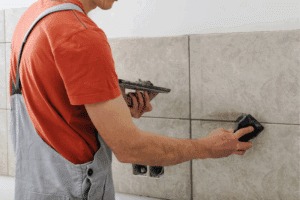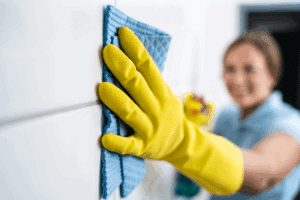Picture this: You mop your floors and wipe down your bathroom regularly, but your tile still looks dingy and your grout seems permanently stained. No matter how much elbow grease you put in, the sparkle just doesn’t come back.
If you’ve ever searched for grout and tile maintenance tips, you’re not alone. Many Windsor, CO homeowners deal with cracked grout, dull tile, and stubborn buildup over time. In this guide, we’ll walk you through practical maintenance tips, explain what causes common tile issues, and share easy steps you can take to keep your surfaces clean, beautiful, and long-lasting.

Top 7 Grout and Tile Maintenance Tips
1. Clean Regularly Using Gentle Products
Use a pH-neutral tile cleaner or a mild mix of warm water and dish soap to gently remove dirt and grime. Harsh cleaners like bleach or vinegar can damage grout lines and dull the tile’s surface over time.
2. Seal Your Grout Once a Year
Grout is naturally porous, which means it can absorb moisture, dirt, and stains. Sealing it annually creates a protective barrier that keeps your grout looking clean and extends its lifespan.
3. Scrub Grout Lines with a Brush
Use a soft or medium-bristle grout brush with baking soda paste or a grout-specific cleaner to lift out built-up grime. Focus especially on high-traffic areas where dirt accumulates the fastest.
4. Fix Cracked or Missing Grout Quickly
Even a small crack in your grout can allow moisture to seep underneath your tile, leading to mold and tile damage. Patching these areas promptly prevents bigger (and more expensive) issues from developing.
5. Prevent Mildew and Mold with Proper Ventilation
Bathrooms and kitchens are naturally humid spaces, so airflow is essential to stop mold growth. Always use a vent fan or open a window during and after showers to keep the room dry and clean.
6. Use Mats and Rugs at Entry Points
Foot traffic brings in sand, dirt, and salt, which can wear down your grout and scratch your tiles. Placing doormats inside and outside your home helps reduce the debris that ends up on your tile floors.
7. Avoid Abrasive Tools and Harsh Chemicals
Skip metal scrubbers and acidic cleaners, which can etch tile and erode grout. Instead, stick to microfiber cloths and gentle mops for your regular cleaning routine.
When DIY Isn’t Enough: Call in a Pro
Sometimes tile and grout need more than just regular care, especially if the damage is already done. If your grout is missing, moldy, or your tiles are coming loose, it’s time to call in a certified tile professional in Windsor.
A professional can deep-clean, reseal, or even regrout your space to bring it back to life. It’s a smart investment to protect your home’s surfaces and avoid future water damage.
Maintenance Tips Based on Your Tile Type

Not all tile is created equal, and neither is how you maintain it. Understanding the type of tile in your home helps you apply the right care routine that protects both the tile surface and the grout lines.
Ceramic and Porcelain Tile
These tiles are the most common and easiest to maintain. Use a pH-neutral tile cleaner weekly and reseal the grout once a year. Avoid abrasive pads, but don’t worry too much about spills. Ceramic and porcelain are less porous than natural stone.
Natural Stone Tile (Marble, Slate, Travertine, Limestone)
Natural stone adds luxury but needs more attention. Never use acidic or vinegar-based cleaners, which can etch the surface. Use stone-specific cleaners, and be sure to seal both the tile and grout more frequently, ideally twice a year.
Glass Tile
Glass is great for backsplashes and accent walls. It’s low-maintenance, but water spots and fingerprints show easily. Wipe down with a soft microfiber cloth and gentle glass-safe cleaner to keep the shine.
Metal or Specialty Tile
These tiles look stunning but are prone to scratching and corrosion. Avoid anything abrasive and always check the manufacturer’s recommendations for cleaning products.
Knowing your tile type helps you avoid damage and keep your surfaces looking beautiful for the long haul.
Tools and Products to Keep On Hand
Having the right tools makes grout and tile maintenance faster, easier, and more effective. Here’s a handy list of what every Windsor homeowner should keep in their cleaning kit:
- pH-Neutral Tile Cleaner – Safe for most tile types and won’t strip sealant or damage grout. Great for regular weekly cleanups.
- Grout Brush or Old Toothbrush – Helps you scrub deep into grout lines without damaging them. A stiff-bristled but non-metal brush works best.
- Grout Sealer – Look for a water-based or solvent-based sealer depending on your tile and grout type. Apply once a year (or more often for high-moisture areas).
- Microfiber Mop or Soft Cloth – Gentle on tile and perfect for streak-free cleaning, especially on glossy or glass tiles.
- Spray Bottle for DIY Cleaners – Mix baking soda and water or mild soap solutions in a reusable spray bottle to clean surfaces without harsh chemicals.
- Knee Pads (Optional but Helpful) – Cleaning grout lines often means getting low, which saves your knees during deep cleaning sessions!
These tools ensure you’re ready for both regular cleanings and occasional deep maintenance.
Common Tile and Grout Maintenance Mistakes to Avoid
Even the best intentions can lead to long-term damage if you’re not careful. Watch out for these common tile and grout care mistakes:
- Using Harsh Chemicals
Bleach, vinegar, and acidic cleaners can break down grout and damage stone tiles. Stick with gentle, pH-balanced solutions to protect your surfaces. - Skipping Grout Sealing
Unsealed grout absorbs water, dirt, and stains. Sealing grout once a year (or more in high-moisture areas) helps prevent long-term damage. - Letting Water Pool on the Surface
Standing water seeps into unsealed grout and can lead to mildew and mold. Always dry floors after mopping or spills, especially in bathrooms. - Using Abrasive Scrubbers or Steel Wool
These tools can scratch tile and erode grout. Use soft bristles or microfiber materials to protect finishes. - Ignoring Small Cracks or Loose Tiles
Tiny signs of damage often lead to bigger issues like moisture damage or tile detachment. Fix issues early to avoid costly repairs.
Conclusion
Taking care of your tile and grout doesn’t have to be overwhelming. With simple habits like gentle cleaning, sealing grout annually, and using the right tools, you can keep your surfaces looking fresh and lasting longer.
These small steps make a big difference, especially in high-traffic areas. And if your tile or grout is showing signs of damage, don’t wait; reach out to a professional for help before the problem grows.


